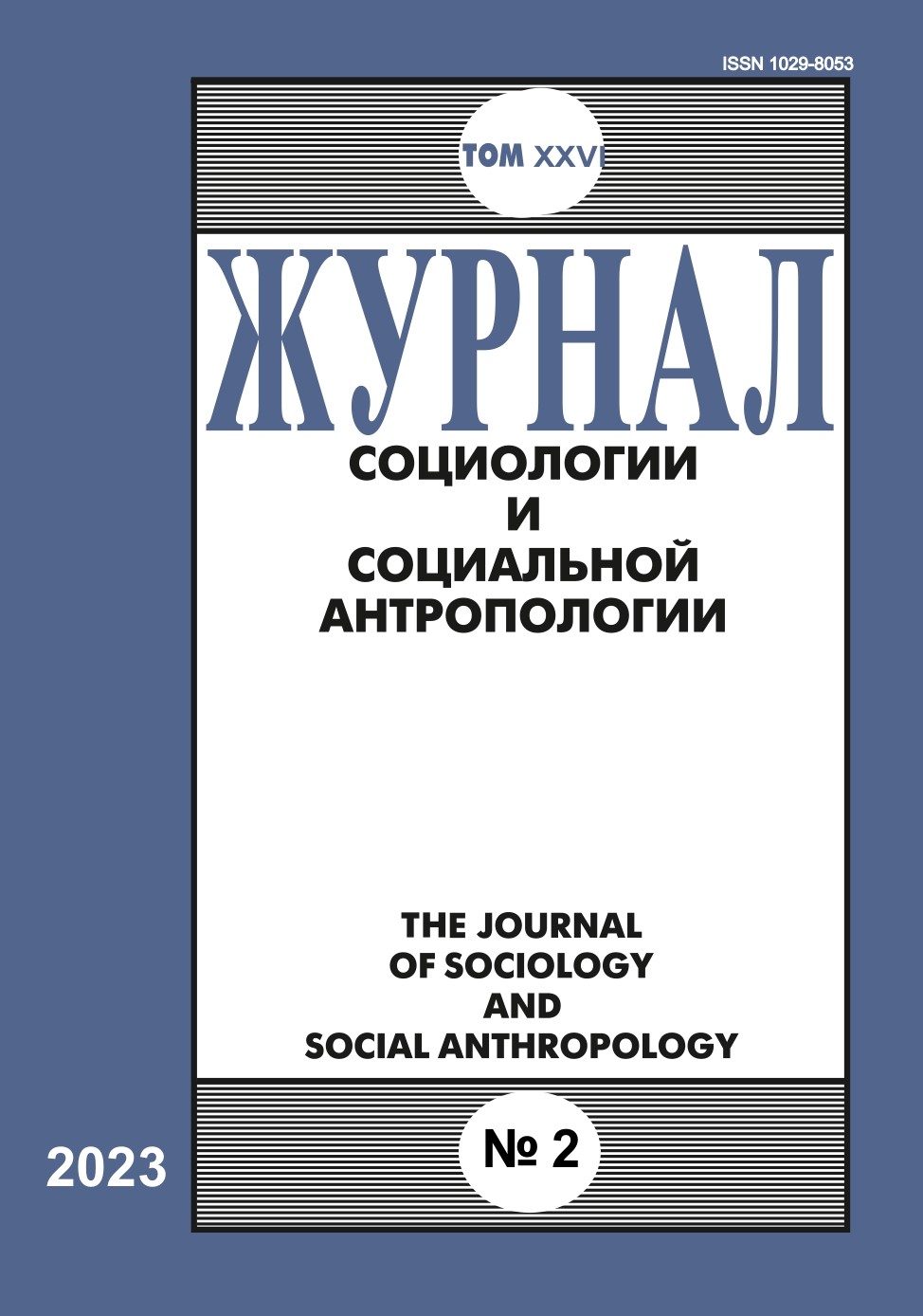Career strategies of employees in the field of Knowledge-Intensive Business Services (on the example of Moscow companies)
Abstract
The article presents the results of a sociological study aimed at identifying the types of career strategies of modern employees in the field of knowledge-intensive business services. The conceptual framework of the study explicates a subjectivist approach in which career strategies reflect the vector of movement towards subjectively determined career goals, thereby revealing the agency of the subject, his choice of career development direction and actions implemented in this direction. Empirical research materials include data from a questionnaire survey (133 respondents) and 11 interviews conducted in Moscow companies in 2022. The survey data served as the basis for hierarchical cluster analysis, which resulted in the identification of three target segments representing different models of career strategies. Thus, in accordance with the direction of the reproduced actions, cluster profiles of «exemplary», «passive» and «proactive» workers were compiled, personal and individual characteristics and features of respondents' career goals were shown in the context of cluster groups. A separate focus of research attention was directed to subjective assessments of intra-organizational and non-organizational conditions for the implementation of career strategies, which allowed us to consider incentives and barriers to building a career in the field of knowledge-intensive business services. The resulting picture is complemented by interview narratives in which employees of Russian companies talked about their own career prospects in a situation of dynamic changes in the labor market and offered various scenarios for the further development of Russian companies in the field of knowledge-intensive business services in modern conditions.
References
Берман Д., Клетцер Л., Макфирсон М., Шапиро М.О. (2008) Выбор вуза, карьера, формирование заработной платы: микроэкономический подход. Вопросы образования, 2: 108–121.
Котомина О. В. (2016) Препятствия развитию сектора интеллектуальных деловых услуг в России. Менеджмент и бизнес-администрирование, 3: 135–144.
Мусина-Мазнова Г. Х. (2011) Зарубежные и отечественные теоретические подходы к изучению понятия «карьера». Наука и школа, 4: 101–107.
Подольская А. А. (2020) Карьерные стратегии женщин-инженеров на предприятиях ракетно-космической отрасли: цели и возможности реализации. Мониторинг общественного мнения: экономические и социальные перемены, 5: 467–489.
Попова И. П. (2021) Карьерный капитал: концептуальные подходы. Вестник РГГУ. Серия «Философия. Социология. Искусствоведение», 1: 78–88.
Радаев В.В. (2002) Еще раз о предмете экономической социологии. Экономическая социология, 3: 21–34.
Чичканов Н. Ю., Белоусова В. Ю. (2020) Влияние цифровых технологий на бизнес российских компаний сектора интеллектуальных услуг. Цифровая экономика: бюллетень [https://issek.hse.ru/mirror/pubs/ share/366167712.pdf] (дата обращения: 18.09.2021).
Шаповалов В. К. (2020) Карьерные процессы: социологические и психолого-педагогические интерпретации. М.: Дашков и К°.
Эфендиев А.Г., Балабанова Е.С., Галицкий Е.Б. (2009) Результаты и проблемы подготовки современного специалиста сквозь призму карьерного роста выпускников-менеджеров. Вопросы образования, 4: 133–152.
Andresen M., Apospori E., Gunz H. et al. (2020) Careers in context: An international study of career goals as mesostructure between societies' career-related human potential and proactive career behaviour. Human Resource Management Journal, 30: 365–391.
Budtz-Jørgensen J., Johnsen C.G., Sørensen B.M. (2019) Against Boundarylessness: The Liminal Career of the Flexible Employee. Organization, 26(6), 917–935.
Chichkanov N., Miles I., Belousova V. (2019) Conditions for innovation in KIBS: Evidence from Russia. Basic Research Program. Working papers Series: Science, Technology and Innovation, No. WP BRP 92/STI/2019: 1–32.
den Hertog P. (2000) Knowledge-intensive business services as co-producers of innovation. International Journal of Innovation Management, 4(4): 491–528
Doroshenko M., Miles I., Vinogradov D. (2014) Knowledge Intensive Business Services: The Russian Experience. Foresight-Russia, 8(4): 24–39.
Miles I., Belousova V., Chichkanov N., Krayushkina Zh. (2021) The Impact of the Coronacrisis on KIBS Sector. Foresight and STI Governance, 15(1): 6–18.
Morgan D. (2014) Integrating qualitative and quantitative methods: A Pragmatic approach. Thousand Oaks, CA: Sage Publications.
Vinogradov D., Shadrina E. V., Doroshenko M. (2018) KIBS for public needs. Economia e Politica Industriale, 45(4): 443–473.
Zieba M. (2013) Knowledge-intensive business services (KIBS) and their role in the knowledge-based economy. GUT FME Working Paper Series A, 7. [https://www.econstor.eu/bitstream/10419/173303/1/wp-gut-fme-a-07-Zieba.pdf] (дата обращения: 18.09.2021).

